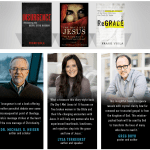 Gary Black, Jr., professor at Azusa Pacific University and author of a recent book about Dallas Willard as well as the co-author with Dallas of a new book (The Divine Conspiracy Continued: Fulfilling God’s Kingdom on Earth) that expands Divine Conspiracy, offers this post to the Jesus Creed blog readers, and he is responding in part to a comment I made on the blog with six points, the sixth point, which Gary Black mentions, concerns the precariousness of the pastoral significance of Mark Galli’s approach.
Gary Black, Jr., professor at Azusa Pacific University and author of a recent book about Dallas Willard as well as the co-author with Dallas of a new book (The Divine Conspiracy Continued: Fulfilling God’s Kingdom on Earth) that expands Divine Conspiracy, offers this post to the Jesus Creed blog readers, and he is responding in part to a comment I made on the blog with six points, the sixth point, which Gary Black mentions, concerns the precariousness of the pastoral significance of Mark Galli’s approach.
I appreciate this very important discussion very much. Especially the dialog between Mark and Scot.
I somewhat agree with Scot’s point that Mark’s position doesn’t seem to leave us much of anything to build on or hope for. But he’s certainly not alone. The seemingly fatalistic or at least pessimistic sense that transformation will remain elusive in this life, reminded me of two articles of long, long ago. One came from the thoughtful pen of Phillip Yancey who lamented his lack of transformation in the Christian life and discussed how he compared Tolstoy and Dostoevsky’s understanding of sanctification as two ways of coming to grips with the sometimes overwhelming mediocrity we find in our own lives and in the church in general. (Christianity Today, July 17, 1995.) The other article was written by Mike Yaconelli in the (sigh) Wittenberg Door which gave Mike’s always honest appraisal of the torturous mental gymnastics he felt necessary to apply in order to explain the elusiveness of an authentically ‘Changed Life’. (Nov. 1992)
Dallas Willard used to refer to the perspectives Yancey and Yaconelli described (that substantive change is, if not impossible, then reserved for only a very special/lucky few) as “miserable sinner” Christianity. He suggested that throughout the ages there has been a longstanding argument between seeing the Sermon on the Mount, and the spiritual life Jesus highlights there, as either forming a deadly legalism or an unattainable idealism. Both leave the Christian in a miserable state of inbetween-ness. But such a theology also misses what Dallas understood as Jesus’ entire intention of the Sermon; to present the opportunity of entering the renovating, purposeful, and grace-filled reality of life lived with God that is made possible-now- through discipleship to Christ in his Kingdom. Such an opportunity is open and available for “whosoever will” since life to the full is quite literally “at hand.” Those with this life are salt and light to others. Now. Right where we are. It’s takes some effort to ignore the profound immediacy of Jesus offer.
Dallas also would wonder out loud why-if real, substantive, and verifiable change isn’t possible now-then how and why should we hope for the power or means of change in the afterlife? What kind of theological system and relationship with God would such an arrangement require?
I can’t help but wonder if, perhaps in part, this is what Mark, TGC, Kevin DeYoung’s, and Tullian Tchividjian are attempting to flesh out.
But Mark is right to point out the malaise in the church. Like Edwards and Wesley before him, they too called for change and lamented the lackluster devotions of their generation. I recognize and appreciate the pragmatic/prophetic desire to call it like we see and or experience it. Dallas did as well. The lack of change, spiritual impotence, immaturity, biblical illiteracy, and missing testimonial witness to the world of the goodness in godliness and holiness can seem rampant at times. Sometimes in our frustration we can feel like asking a John the Baptist-like question. “Is this all their is or should we look for something else?” At times Dallas too became distressed at the lack of transformational progress he witnessed in the lives of those he spent his life and ministry attempting to manifest and teach the kingdom to. This discontent proved a major motivating factor for him to write each of the books he published, and to maintain a tireless speaking schedule. As a result many were able to catch a vision for a different kind of life with God that could be both experienced and manifested to others. But he admitted the road was hard and often very lonely. So, I applaud the honest reflection in these questions and concerns that I believe stem from a desire or yearning for something better.
I want to gently suggest there is another option than the two Mark mentioned earlier.
Evangelical brands of Christianity in the west have too often espoused only a “change when I die” eschatology/soteriology. This doesn’t mean they are “bad” Christians. It simply means they have not yet developed the imagination, nor received any substantive teaching, regarding how to begin living the kinds of lives that people like Abraham, Moses, David, Ezekiel, Daniel, Mary, John the Baptist, or Paul, lived in and through the power of God while on earth. This is a result of modern evangelicalism having never developed a stomach (much less a budget) for discipleship as the PRIMARY objective of the church. Instead, most Christians today fully expect to become their perfect/perfected selves only after leaving earth and entering the eternal (eschatological) character reformation project in heaven. This is a widely held belief that unconsciously demotivated us from pursuing any sustained commitment to the intentional efforts involved in character transformation. Just like the rapture theology caused many conservative evangelicals to forsake responsible stewardship of the earth, so too a “change when I die” dogma stalls any move toward holiness.
Dallas saw the spiritual transformation of the soul from death to new life as similar to the addicts road to recovery. Certainly Mark would join me in applauding not only the demonstrated potential for change but the evidence of changed lives within the many wonderful recovery groups now available. But that’s precisely what the church is missing. AA and the like are organized toward the one objective of radical transformation. Lives depend on it. The church, generally, is not so singularly focused or seriously devoted.
It’s not that the gospel is unable to do the work of transformation nor that we are stocked with bad Christians. It’s that our mainstream gospel remains single-decision-centric not whole-life-discipleship-
In light of the soon to be re-released Nicolas Cage version of “Left Behind” it’s no wonder why the ever popular theology of the rapture still attracts so many. It can become ones only hope of escaping from the utter hopelessness of earthly life. I just don’t see Jesus or the apostles whistling that tune in the New Testament.
We can never forget, despite the demise around us, Emmanuel. God is with us. God is for us. What can stop us? Only us.















